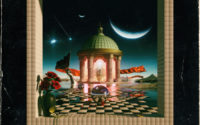Under The Influence #24: Lapsarian on “Spiderland” by Slint!
28 years ago in 1991, Louisville, Kentucky American Rock quartet Slint released their second and final album, the follow up to debut “Tweez” which was recorded by engineer Steve Albini in 1987. Entitled “Spiderland” it is hugely influential on the Post-Rock scene the album is known for its angular guitars, irregular time signatures and having the alternating schizophrenic dynamics approaching a Bipolar disorder. Guitarist and vocalist Brian McMahan formerly of Squirrel Bait uses The Pixes technique of quiet-quiet-Scream and takes it further, moving from one extreme to another with mumbling spoken word and screaming to the point of vocal chord strain within the same movement. Despite critical acclaim “Spiderland” is an album which, like the finest paintings, has only really been appreciated and acknowledged after the fact. Selling 50,000 copies and seen by most as one of the corner stone foundations of the Math-Rock genre.
Lasparian drummer Lee Stablein comments: “Everything about Slint seems to be a contradiction, and that makes it almost impossible to talk about what makes Spiderland great — you inevitably end up talking around it without really getting to the core, much like when people try to describe pain, or love, or any number of other ephemeral, human things. A big part of Spiderland’s influence and appeal to us is rooted in that difficulty: it is a singular, unique album by a singular, unique band. Though Slint spanned many styles and either co-invented or re-invented a few of them, Spiderland is impossible to nail down. It simply is. The three of us who dig this record tend to discuss it as a “post-rock” album and we seem to have each found it relatively early in our respective dives into that style, but we agree that it’s unlike any post-rock any of us can name. Chase has talked about songwriting elements — how Slint’s sound is ‘slanted,’ off, weird and how the dynamics are so emotionally charged, but in a completely different way to the punkish and hardcore stuff that came before. Clay brings up similar elements but from a completely different direction. Slint’s emotions are powerful, yes, but they’re also weird: Spiderland’s mastery often lies in its expression of confusion or desperation or a fugue state, or other, “off-kilter” sorts of feelings. Its heaviness is weighty, but seems at odds with the conventions of heavy music. The more we talk about this album, and the more I think about it, the more certain words seem to come to the fore: “weird;” “off-kilter;” “odd;” “dissonant;” “deconstructed.” At the end of the day, it seems like the thing we love most about Spiderland, and the thing that resonates most with us, is how uncompromising it is. Structurally, stylistically, tonally, and emotionally, Spiderland simply is what it is, with no apologies or self-consciousness about that. Every note is wrong, but not a single note is out of place; the emotions are the big, scary, borderline dangerous emotions of teenagers who know how weird and lost they are, and as a result every strange component has visceral meaning. That refusal (or inability) to stick with what is expected or “appropriate,” stylistically or otherwise, when the song calls for more is a big part of what makes Spiderland so affecting, and I think that’s something we hope to do with Lapsarian as well.”
“Ruminant” by Lasparian is out now and available via bandcamp



